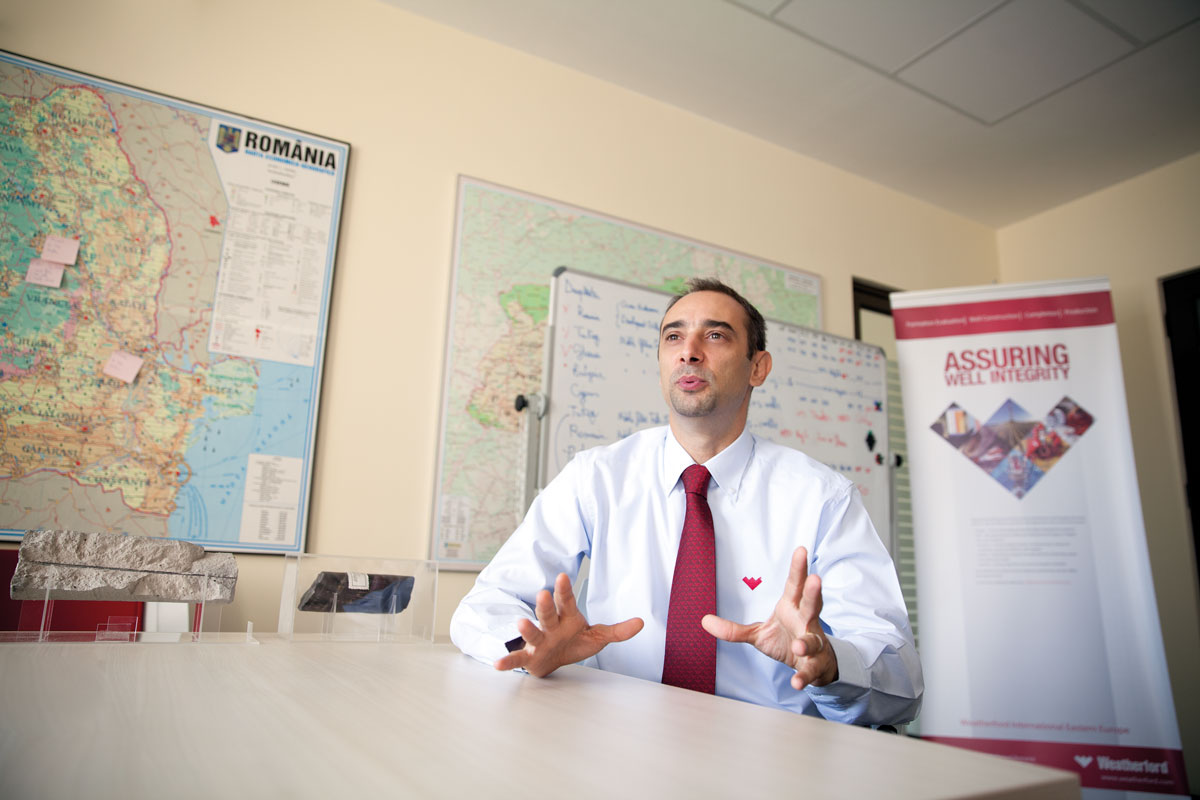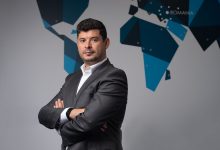Alberto Collamati: Crisis to leave major legacy behind – O&G companies reshaping
Weatherford International, one of the largest multinational oilfield service companies providing innovative solutions, technology and services to the oil and gas industry, was awarded Best International Oilfield Services Company at ADIPEC in 2015. In our conversation with Alberto Collamati, General Manager South Eastern Europe, we found out about the biggest challenges the company has faced throughout this year, the operational highlights and its opportunities in the energy sector over the coming years.
From adapting to new technological advances and regulation changes to choosing targeting strategies and recruiting top personnel, Managing Directors have a lot of hard work. What would be the most-needed skills to master this important position?
Alberto Collamati: Managing a company implies dealing every day with many concepts of which the majority you don’t have an expertise on and need to rely on specialists since the consequences for mistakes are major (Tax, Finance, Legal, HR, etc.). At its very core, any company is made out of people that interact with people. I spend, or I should better say, I invest a lot of my time dealing with people, I try to understand their strengths, their concerns, their careers plans, their personal objectives, decrypt their personalities to ensure that everyone fits in the right place in the organization and is set to outperform.
As such, the skills I value the most in the business leaders are the ability to quickly identify, assess and appoint the right persons and personalities type for the right functions.
Eventually the final outcome of the process leads to being able to delegate, trust and empower the team.
Internal and external audits are then part of the ‘trust but verify’ philosophy.
You have more than 14 years of global experience in Oil & Gas Service Companies managing Operations, Sales, P&L, Personnel, Tax under the framework of Local Legislations and Corporate Standards & Policies. How do you see the South Eastern Europe O&G markets? And now place Romania in this landscape…
Alberto Collamati: In my crystal ball I see 2017 activity in South East Europe slowly picking up compared to 2016 due to the oil price slightly upward trend YoY, however most of the analysts expect the oil price to be quite volatile for some time. This uncertainty affects how Operators assess profitability on short term projects taking conservative approaches that might put on halt projects otherwise profitable.
In conclusion, I foresee 2017 as another year of hard work for O&G Operators and Service Companies.
Coming to Romania, with the deepwater exploration being delayed in the Black Sea by years, the only available market will be land, commodity type business with some potential for high profile wells where new technology will help operators reduce costs or minimizing risks.
Romania has been, and will always be, a Country of opportunities and plenty of expertise for what concerns O&G sector, and therefore I am optimistic on its future rebound and definitely it will gain a place within Europe to flag and stay in.
New energy reports show how oil and gas companies need to rapidly evolve their business models to continue to thrive in the future business marketplace. How will suppliers adapt to these changing markets conditions?
Alberto Collamati: Income revenue dropped drastically in the O&G Service Industry due by a combination of reduced activity and price concessions given to operators to allow them to continue developing projects that otherwise would have not been economically pursued. It is no secret that the only way to cope with such aggressive scenario is to cut costs at the same rate the revenue drops. The exercise is not an easy one when we talk about double digit cuts and several constraints to respect such as: complying with Local Regulations, ensuring the Safety, Training & Certifications, respecting Service Quality standards.
Fast and wisely cutting costs is not the only exercise that keeps Weatherford internally busy and focused.
I spend a lot of time to understand how the conditions around the market changes. Basically, to understand the ‘new rules of the game’ to keep ethically playing and to position the company in new market niches.
There are two quotes that come to my mind: “Don’t let a good crisis go to waste”, (W. Churchill) and “It is not the strongest of the species that survives, but rather, the one which is most adaptable to change” (on dispute of belonging to C. Darwin).
Both quotes set a different and more optimistic way to approach a crisis: looking at the possibility to take advantage of it by thinking different and looking at the opportunity to challenge the status quo mindset. Status quo means barriers and during a crisis most barriers fall down opening options for new opportunities.
How does the financial pressure on the oil and gas sector impact the work relationship between operators and suppliers?
Alberto Collamati: Work relationships got much tighter with Procurement department! Besides the obvious challenge, as mentioned above, during a crisis we can look from two perspectives. Operators and Suppliers found themselves in a new ‘unexplored territory’ for which the only way to get out of it is together. If we define Relationships as ‘trusted collaborations’, then they got tighter with the Engineering department for what concerns looking for new options to keep working at lower costs. A lot of time has been invested in re-engineering the processes or finding alternative technical solutions to meet the new customer expectations. We have been successful in some, and not so much viable in others, but we tried to go beyond the current mindset and challenge the status quo. I believe all the Service companies have been very fast in adapting to the new market conditions, unfortunately the rate of activity decrease was hard to keep up with the cost control side of the equation.
On the other side of the coin, the current low activity level combined with Operators cost cutting targets pushed the Service Companies to their limits and as a consequence some declared insolvency, some left the country, some will leave as they found more profitable businesses elsewhere, others will eventually leave. For any company leaving the country, the market loses local experience and trusted providers based on years of successful collaborations.
What about company’s results so far? Which are the biggest challenges Weatherford have faced throughout this year?
Alberto Collamati: Recently, Weatherford’s direction was steadfast, and our drive and intensity increased throughout the year. We focused on doing more than just rapidly and efficiently adjusting to steeply deteriorating market conditions. We also endeavoured to take advantage of the extreme market conditions to establish structural efficiencies as well as implement productivity enhancements – changes that would secure for the Company a much higher level of operating and financial performance when the market turn would come.
What are Weatherford’s operational highlights in 2016?
Alberto Collamati: Confirming our pledge to safety, quality and reliability and despite a year of massive decline and reduction in force, Weatherford achieved the highest metric for employee safety in the Company’s recorded history. Safety achievements are seldom compatible with disruptions in the marketplace, yet Weatherford’s results speak for themselves.
During the 2015 Abu Dhabi International Petroleum Exhibition and Conference (ADIPEC), Weatherford was awarded Best Oilfield Services Company (International) at the Excellence in Energy Awards ceremony.
Weatherford also achieved several other notable benchmarks, including 16% reduction in total recordable incidents (TRIR), 23% reduction in the lost time incident rate (LTIR) and a 33% reduction in the preventable vehicle incident rate (PVIR). Lastly, the Company capped off the year with the No2 Security Program in the Energy Sector in the Security Magazine’s Security 500 Rankings Global.
What do you think is the best way to make projects viable in a low oil price environment?
Alberto Collamati: As you know, there is no ‘One case fits all approach’. Every project needs to be assessed almost on its own. However, taking a general approach, at the end the proposed solution has to be an overall production increase/cost saving for the operator and that can be the results of: new processes/technology to increase production or to better estimate production, less unit cost, less risk (hence less risk allocated in the economics), increased efficiency (hence less costs allocated to NPT in the budget phase), faster execution resulting in less overall costs.
Re-connecting to the previous question, I believe the human capital is what makes the difference in this market: people able to understand the problems and offering viable solutions.
I believe that compared to other industries that play in very competitive global markets and need to run lean & efficient as a matter of surviving, the O&G industry is lagging behind in many domains and there are opportunities to optimize and streamline processes. I think the re-shaping of O&G companies will be the major legacy this crisis will leave behind.
Where would you see the most opportunity for Weatherford in the energy sector over the coming years?
Alberto Collamati: Weatherford sees opportunity in three distinguishable segments: Deepwater, Aging Reservoirs and Unconventional.
Deepwater magnifies typical drilling challenges. The remote locations, the increasingly harsh downhole environments, and costly rig-spread rates make well integrity and drilling reliability of utmost importance in deep water. We help transform deepwater challenges and reservoir uncertainty into long-term well integrity and bookable reserves. When looking at Aging Reservoirs however, the challenges couldn’t be more diverse. As fields mature around the world, operators are seeking new ways to extend the economic lives of the reservoirs and to maximize recovery. Weatherford offers the technology and expertise to address the integrity and reliability challenges of aging wells. These challenges would otherwise make many operations economically unviable. Our integrated and innovative technology and services confront these challenges and enable clients to optimize and increase production throughout the lifecycle of the well. Lastly, Unconventional assets are rich in resources and high in economic potential, but pose unique challenges that range from uncertain geology to rapid decline rates and tight project economics. A pioneer in this area, Weatherford has expertise and leadership in challenging shale plays. We have continued to strengthen our robust portfolio of services and technologies so clients can more easily access and maximize unconventional resources.
What were the most important lessons you’ve learned during your term of office? What do you like most about your job?
Alberto Collamati: It is now over three years I am working in this position (which for WFT standards is a middle to long tenure!). Between the assignments in Italy and Romania I had the opportunity to run the business in the upside mode around 2013 and 2014 made of shortage of personnel and record revenue month over month, before being the ‘Cost Cutter’ from 2015 up to now, exposed to the opposite results.Every assignment gives an opportunity to learn and for myself, coming from a technical background, has been an extremely interesting and enriching experience that widened my understanding of what happens on the background of Business Units Lines that focus on technical proposals and wellsite executions.
I got exposed to the ‘Legal Entity box’ full of legislation requirements to fulfil and also exposed to manage the support functions to help Product Lines run smoother their operations and in a sort of way, I am the Service Provider to my internal customer, the Business Units Lines.
I enjoyed the Cross PL exposure, coming from WL operations, I managed to have a broader overview of all the other Product Service lines within WFT, understanding their strengths, challenges, business model, pricing and cost strategies, etc.
Another important point for me that makes me enjoy my job is the trust and freedom in the decision making I got from my management that helps motivating and feeling empowered which results in faster decisions taken.
Last but not least, WFT South East Europe has a great team of highly committed professionals starting from field operators that are the face of Weatherford where the business is generated, up to the upper level in the hierarchy. Working with them, and for them, for me is a pleasure and a privilege.







